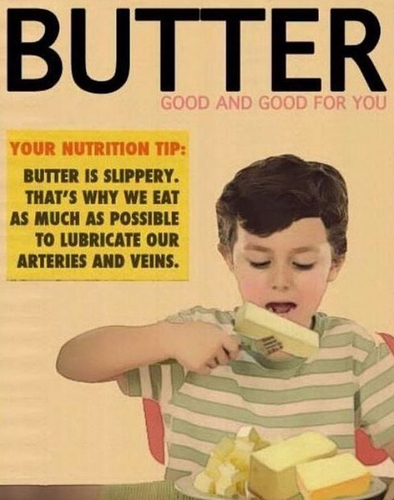Butter, it's good for you
That kid is going to vomit.
When I started keto I ate butter like it was a block of cheese because Jimmy Moore promoted that. We have come a long way in a few years.
I saw my friend’s kid eat butter like that. It’s really not an issue.
Jimmy Moore’s mistake was that he advocated high fat without regard to the type of fat. If you’re gorging on bacon, fatty pork, chicken, avocados, store-bought salad dressings and/or mayo, you’re getting a ton of PUFAs. Adding butter to things probably is not a bad idea, as butter is very low PUFA.
And as someone who has tried high protein and high saturated fat, it’s currently unclear to me which is best. I’m about to try extended comparisons of both.

I love butter and use it a lot but can’t imagine eating it straight. For me, I think I’d hurl.
Oh, no!!! Geez, pork is one of the main proteins we eat. All this time, I thought it was okay.  After seeing it on here, I have cut out the mayo. We used to eat a lot of it. I also don’t use salad dressing any more.
After seeing it on here, I have cut out the mayo. We used to eat a lot of it. I also don’t use salad dressing any more.
Dr. Phinney points out in a couple of lectures that the PUFA’s are the nauseous fats. Saturates and monounsaturates don’t have that effect. He says that whenever anyone says, “How can you eat that much fat? It makes me sick!” his reply is automatically, “Switch from vegetable oil to butter and lard, then.”
Jimmy Moore is a writer and journalist who was grossly obese at one point. He lost an enormous amount of weight on a ketogenic diet and has been popularising it ever since. He’s had a number of problems since losing the weight initially (some self-inflicted, some because his metabolism is damaged), so there are people who disparage him, while others still think highly of him. I believe he is still doing podcasts.
Personally, I have always found his personality somewhat abrasive, so I haven’t been that interested in following him, but I am grateful for what he has done for the keto community.
I’ve tried several incarnations of diet also and have been toying with the thought that none is better than the other (in isolation). Though I think it’s tough to argue against eating food that resembles what exists in the wild and further to exclude things that don’t.
Different macros seem to have more/less influence over my satiety at different times and I think it’s more what the body is looking for at that time, be it raw material (protien) or energy (fat/carbs). I don’t seem to reach satiety until I get enough of whichever it is, but it is definitely not a totally static ratio.
Humans have been eating pigs and chickens for thousands of years, and their wild predecessors for thousands of years before that. Without problems as far as we know. I think if you’re eating lean pork (and chicken) the concern about PUFA is overblown. On the other hand if you’re eating lots of fatty pork and chicken and/or consuming additional seed oil based products (including olive/avocado oils), it could be a problem. For example, bacon contains 12 1/2% sat fats (mostly palmitic and stearic acids, but including some of all of the rest), 16% MUFAs (mostly oleic acid), and 6% PUFAs (mostly linoleic acid, but all of rest). In fact, bacon contains significantly more protein than overall fat, so much so that I use bacon bits/crumbles primarily as a protein source.
My opinion is that the problems with PUFA are due primarily, or possibly exclusively, to consuming grain and other plant sources (and seed oils particularly) that contain PUFA with a very skewed ω6:ω3 ratio. It wan’t until the end of the 19th century that seed oils were invented (cottonseed was the first) with their highly concentrated proportions of PUFAs. PUFAs are in fact essential fatty acids. We don’t need to eat much, and just have to keep the ω6:ω3 ratio closer to 1:1 rather than 20:1.

